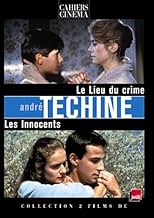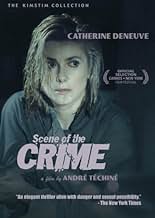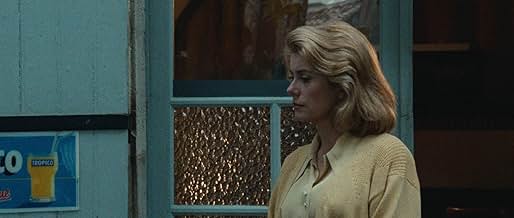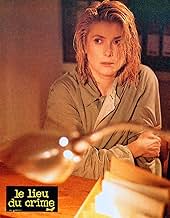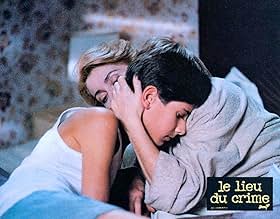Le lieu du crime
- 1986
- Tous publics
- 1h 30min
NOTE IMDb
6,4/10
1,1 k
MA NOTE
Dans les bois, un garçon de treize ans est attrapé par un détenu évadé et lui dit d'apporter de l'argent plus tard dans la journée. Le garçon fait ce qu'on lui dit, seulement pour être attaq... Tout lireDans les bois, un garçon de treize ans est attrapé par un détenu évadé et lui dit d'apporter de l'argent plus tard dans la journée. Le garçon fait ce qu'on lui dit, seulement pour être attaqué par le partenaire du condamné.Dans les bois, un garçon de treize ans est attrapé par un détenu évadé et lui dit d'apporter de l'argent plus tard dans la journée. Le garçon fait ce qu'on lui dit, seulement pour être attaqué par le partenaire du condamné.
- Réalisation
- Scénario
- Casting principal
- Récompenses
- 3 nominations au total
Christine Paolini
- Suzan
- (non crédité)
Avis à la une
"Scene Of The Crime" (1986) is a "calm" thriller very much in the Claude Chabrol tradition: the crime(s) is used as a catalyst for human drama, in this case mostly about a dysfunctional family. Pretty rural scenery and another strong Catherine Deneuve performance (here middle-aged, but ageless) are the film's main assets: in some of the best scenes, she shares the screen with another French cinema legend, Danielle Darrieux. On a small note, this is probably the first film I have seen that - logically - suggests that characters who have spent a lot of time in prison should be ghostly pale! **1/2 out of 4.
Thomas, a young teenager ably played by Nicolaus Giraudi, is from a troubled background. His parents are divorcing; he has problems at school and has a reputation that he tells fibs and is not to be trusted. Picking flowers for his grandmother, he stumbles upon an escaped convict, Martin (Wadeck Stanczak). Martin convinces Thomas to bring him money. Thomas complies and when he delivers the money is assaulted by Martin's accomplice, another escaped convict. Martin helps Thomas escape.
Thomas's mother Lili (Catherine Deneuve) runs a club on the lake. After a violent altercation between Martin and his accomplice, an injured Martin goes to the club where he meets Lili. She feels attracted to him and decides to help Martin.
The film is full of nuances. The dynamics between Thomas and his parents, and his grandparents and parents is cleverly and in an understated manner brought to our attention. A good example of that is the strained atmosphere and undercurrents at the grand luncheon held to celebrate Thomas's first communion.
The soundtrack is outstanding too. In one of the scenes in the woods where suspense is reaching breaking point, André Téchiné uses the sound of cicadas and crickets building up to a crescendo to accentuate the tension. A very clever technique indeed.
Cinematography is of the highest quality too.
If there is one thing I will remember, it is the quality of the performances; they all are really good. Special mention must be made of the commanding performances by Catherine Deneuve, and by Danielle Darrieux who plays Thomas's grandmother.
I score this film a high 8/10.
Thomas's mother Lili (Catherine Deneuve) runs a club on the lake. After a violent altercation between Martin and his accomplice, an injured Martin goes to the club where he meets Lili. She feels attracted to him and decides to help Martin.
The film is full of nuances. The dynamics between Thomas and his parents, and his grandparents and parents is cleverly and in an understated manner brought to our attention. A good example of that is the strained atmosphere and undercurrents at the grand luncheon held to celebrate Thomas's first communion.
The soundtrack is outstanding too. In one of the scenes in the woods where suspense is reaching breaking point, André Téchiné uses the sound of cicadas and crickets building up to a crescendo to accentuate the tension. A very clever technique indeed.
Cinematography is of the highest quality too.
If there is one thing I will remember, it is the quality of the performances; they all are really good. Special mention must be made of the commanding performances by Catherine Deneuve, and by Danielle Darrieux who plays Thomas's grandmother.
I score this film a high 8/10.
The title might lead viewers to expect an elegant parlor room whodunit, but this elegant French import is something else entirely: part thriller, part domestic melodrama, and in large part a story of the end of innocence for a troubled young boy on the threshold of adulthood, who stumbles on the hideout of an escaped convict. Under threat of death the boy is sworn to silence, but the real trouble begins after his divorced mother learns the secret and becomes fatally attracted to the fugitive. The story unfolds with rare narrative subtlety, expressed in unspoken thoughts and barely repressed emotions. Too bad the plot is then allowed to collapse in the final act, with all the conflicting elements forced together in a rushed climax, followed by a long, inconclusive fade-out meant to appear ambiguous but looking more like the end result of writer's block. The weak resolution partially mars an otherwise attractive and well-acted drama, handsomely photographed in a glorious corner of French countryside at the end of a long, dry summer.
As in most of André Téchiné's films, Le lieu du crime is a slow-burning psychological thriller revolving around repressed emotions, fractured families, and the search for love. From the opening scene in a remote cemetery-a clear homage to the opening of Great Expectations-to the closing shot of Lili being driven into exile in a police van, this is a story of characters clinging to freedom in any form they can grasp.
Let me make my bias clear: I am an Alfonso Cuarón fan, and his adaptation of Great Expectations remains my favorite. Still, even the subtle nod to Dickens in Téchiné's work had me wishing, "If only Téchiné would direct a Charles Dickens adaptation!"
With assistance from co-writers Pascal Bonitzer and Olivier Assayas (both of whom have since become directors themselves), Téchiné weaves narrative twists that obscure some of the plot's illogical turns, keeping the audience constantly guessing.
Pascal Marti's signature unsettling camera movements and deceptively simple editing style evoke the tension and immediacy of rapid sketches. From the first frame to the last, nearly every scene is imbued with a sense of anticipation and menace. This is a post-New Wave work where human and psychological motivations take precedence over formal innovation, yet it carries the unmistakable traces of New Wave cinema-elements we sorely miss in contemporary French filmmaking.
The casting is praiseworthy, particularly Catherine Deneuve, who delivers a subtle and commanding performance, and Nicolas Giraudi, whose portrayal of a lost child searching for a father figure is equally compelling.
Let me make my bias clear: I am an Alfonso Cuarón fan, and his adaptation of Great Expectations remains my favorite. Still, even the subtle nod to Dickens in Téchiné's work had me wishing, "If only Téchiné would direct a Charles Dickens adaptation!"
With assistance from co-writers Pascal Bonitzer and Olivier Assayas (both of whom have since become directors themselves), Téchiné weaves narrative twists that obscure some of the plot's illogical turns, keeping the audience constantly guessing.
Pascal Marti's signature unsettling camera movements and deceptively simple editing style evoke the tension and immediacy of rapid sketches. From the first frame to the last, nearly every scene is imbued with a sense of anticipation and menace. This is a post-New Wave work where human and psychological motivations take precedence over formal innovation, yet it carries the unmistakable traces of New Wave cinema-elements we sorely miss in contemporary French filmmaking.
The casting is praiseworthy, particularly Catherine Deneuve, who delivers a subtle and commanding performance, and Nicolas Giraudi, whose portrayal of a lost child searching for a father figure is equally compelling.
It is generally considered that Catherine Deneuve 'came of age' as an actress in 'Le Dernier Métro' for Francois Truffaut. Their relationship had been far more than purely professional and his death four years later prompted her to take a much-needed break from filming. When she returned to the fray she made this film for André Téchiné with whom she had already established a strong professional rapport in 'Hotel des Amériques'.
Téchiné was renowned for his skill with actors and his style of direction suited her perfectly, so much so that four more collaborations were to come, notably 'Ma Saison Préférée'.
Although very much a vehicle for his leading actress, every character is well drawn in this portrait of fractured relationships and family disintegration. Téchiné excelled in depicting what one critic has termed 'outward conformity and inner confusion' and this film is certainly no exception.
Téchiné has elicited a marvellous performance from Nicolas Giraudi as her troubled teenage son whilst Victor Lanoux is pitch-perfect as her ex-husband. Claire Nebout makes a striking debut whilst the charismatic Wadeck Stanczac appears in his second film for this director. The grandmother who vainly tries to keep up appearances and preserve the family unit is played by Danielle Darrieux, a doyenne of French cinema and one of its true 'greats'.
The somewhat melodramatic material has been tempered by the literate script and by Téchiné's sensitive, elegant direction. The natural setting is beautifully captured by Pascal Marti whilst Philippe Sarde's score is effective but never intrusive.
Mlle Deneuve fondly remembered her participation in this as giving her a pleasure similar to that she had experienced when making 'Le Dernier Métro' and Téchiné freely admitted that their collaboration was the only area where his work showed continuity. Every director needs a Muse and some are lucky enough to find one.
Téchiné was renowned for his skill with actors and his style of direction suited her perfectly, so much so that four more collaborations were to come, notably 'Ma Saison Préférée'.
Although very much a vehicle for his leading actress, every character is well drawn in this portrait of fractured relationships and family disintegration. Téchiné excelled in depicting what one critic has termed 'outward conformity and inner confusion' and this film is certainly no exception.
Téchiné has elicited a marvellous performance from Nicolas Giraudi as her troubled teenage son whilst Victor Lanoux is pitch-perfect as her ex-husband. Claire Nebout makes a striking debut whilst the charismatic Wadeck Stanczac appears in his second film for this director. The grandmother who vainly tries to keep up appearances and preserve the family unit is played by Danielle Darrieux, a doyenne of French cinema and one of its true 'greats'.
The somewhat melodramatic material has been tempered by the literate script and by Téchiné's sensitive, elegant direction. The natural setting is beautifully captured by Pascal Marti whilst Philippe Sarde's score is effective but never intrusive.
Mlle Deneuve fondly remembered her participation in this as giving her a pleasure similar to that she had experienced when making 'Le Dernier Métro' and Téchiné freely admitted that their collaboration was the only area where his work showed continuity. Every director needs a Muse and some are lucky enough to find one.
Le saviez-vous
- AnecdotesThe film underwent an HD restoration in 2018 by Eclair, with the support of Arte France's cinema unit and MK2 Films.
- GaffesWhen Thomas first tries on his suit that "itches", his top shirt button is undone. But when he undresses in his room shortly after that, he undoes that button too.
- Versions alternativesVideo version runs 74 minutes.
- ConnexionsFeatured in Danielle Darrieux: Il est poli d'être gai! (2019)
Meilleurs choix
Connectez-vous pour évaluer et suivre la liste de favoris afin de recevoir des recommandations personnalisées
- How long is Scene of the Crime?Alimenté par Alexa
Détails
- Date de sortie
- Pays d’origine
- Langue
- Aussi connu sous le nom de
- La mauvaise herbe
- Lieux de tournage
- Auvillar, Tarn-et-Garonne, France(street scenes, hotel, bridge over river)
- Sociétés de production
- Voir plus de crédits d'entreprise sur IMDbPro
Box-office
- Montant brut aux États-Unis et au Canada
- 164 187 $US
- Durée1 heure 30 minutes
- Mixage
- Rapport de forme
- 2.35 : 1
Contribuer à cette page
Suggérer une modification ou ajouter du contenu manquant

![Regarder Bande-annonce [OV]](https://m.media-amazon.com/images/M/MV5BMGZlMGQ4MjQtNTJkNC00MmMzLWFhYzgtMjZlNWFmY2NhMGY0XkEyXkFqcGdeQXRyYW5zY29kZS13b3JrZmxvdw@@._V1_QL75_UX500_CR0)
